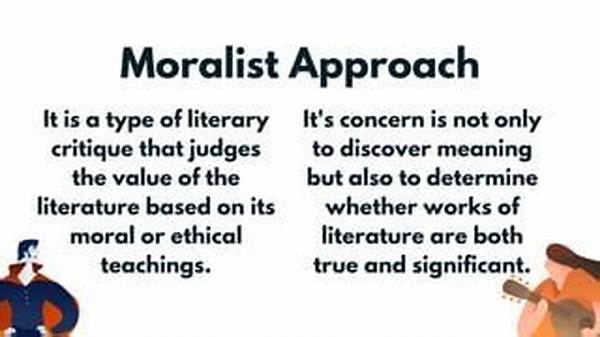Literature has always been a mirror to human experiences, reflecting our deepest emotions and most profound lessons. By delving into the works of literary greats, we uncover moral teachings that resonate across generations. These timeless tales offer a treasure trove of wisdom, providing insight into the complexities of human nature, the struggles of ethical decision-making, and the triumphs of character. Through their narratives, authors dissect moral dilemmas and offer resolutions that inspire, provoke thought, and enlighten readers.
Delving into the Universal Lessons
The stories penned by literary greats are more than mere entertainment; they are vessels of wisdom encompassing moral teachings that remain relevant today. For instance, Charles Dickens’ novels often explore themes of social justice and redemption, encouraging readers to empathize with the underprivileged and question societal norms. Similarly, Jane Austen subtly critiques social class structures while championing authenticity and independence.
By engaging with these works, readers encounter a vast spectrum of human virtues and vices, guided by the moral teachings from literary greats. These lessons inform our understanding of concepts like loyalty, love, sacrifice, and integrity. Each tale offers a unique perspective, challenging us to reflect on our values and actions in the context of the world around us. These stories serve as reminders that while times may change, the core truths about humanity often remain the same.
Moral Teachings Embodied
1. In Harper Lee’s “To Kill a Mockingbird,” moral growth is epitomized through empathy and understanding.
2. “The Great Gatsby” by F. Scott Fitzgerald offers insights into the perils of excessive ambition and materialism.
3. Dostoevsky’s “Crime and Punishment” explores the moral ramifications of crime and the redemptive power of suffering.
4. In “Pride and Prejudice,” Jane Austen accentuates the importance of humility and discernment.
5. George Orwell’s “1984” serves as a stark warning against the erosion of truth and individuality.
Timeless Truths in Classic Narratives
Literary greats often weave intricate patterns of moral teachings through their stories, creating narratives that evoke both contemplation and emotion. The enduring impact of these stories lies in their ability to convey lessons about life, humanity, and ethics in a compelling manner. William Shakespeare’s plays, for instance, offer profound explorations of human nature—examining themes of power, betrayal, and love. Whether it is Hamlet’s quest for vengeance or King Lear’s descent into madness, Shakespeare’s plays guide readers through the labyrinth of complex moral landscapes.
Lessons derived from these works often transcend cultural and temporal boundaries. Moral teachings from literary greats encourage readers to adopt a more introspective perspective, prompting self-examination and a reevaluation of personal beliefs. As we immerse ourselves in these narratives, we gain a deeper understanding of what it means to lead a life of moral integrity and empathy. These stories persist as touchstones for ethical guidance and personal growth.
Exploring Characters as Moral Arbiters
The characters created by literary geniuses often stand as testaments to moral teachings. They embody virtues and shortcomings, showcasing the multifaceted nature of humanity. In Victor Hugo’s “Les Misérables,” the contrasting paths of Jean Valjean and Javert highlight the themes of grace and justice, illustrating the transformative power of compassion over rigid morality.
Similarly, Leo Tolstoy’s “Anna Karenina” delves into the complexities of love and fidelity, challenging readers to question societal norms and personal accountability. These stories, rich in moral teachings from literary greats, use characters as mirrors to our own ethical journeys. They serve as benchmarks, offering guidance on navigating life’s moral maze with courage and thoughtfulness, emphasizing that true moral understanding arises from empathy and introspection.
The Role of Setting in Moral Lessons
Settings in literature are not merely backdrops; they are integral to conveying moral teachings. The turbulent landscapes of war in Erich Maria Remarque’s “All Quiet on the Western Front” underscore the futility and horror of conflict, prompting reflections on peace and humanity.
In contrast, the sprawling estates in Emily Brontë’s “Wuthering Heights” frame the intense passions and destructive tendencies of its characters, illustrating the moral complexities of love and revenge. Through these vivid settings, moral teachings from literary greats become intertwined with the environment, enriching the narrative with layers of meaning. Insights gained from these stories enlighten readers, offering nuanced perspectives on ethics shaped by the interplay between characters and their surroundings.
Philosophical Underpinnings in Literature
Beyond the narrative arcs and character developments, the philosophical underpinnings in literature present a profound exploration of moral teachings. Authors like Albert Camus in “The Stranger” delve into existential questions, forcing readers to confront their own beliefs and ideologies. Through the lens of existentialism, Camus challenges the conventional understanding of morality, provoking thought on human free will and the search for meaning.
The philosophical musings found within these works carry moral teachings from literary greats that question and potentially transform preconceived notions. Encouraging readers to engage in critical thinking, these narratives stimulate intellectual curiosity, urging one to contemplate life’s profound ethical dimensions. Philosophical reflections in literature facilitate a continuous dialogue between the reader and the text, ultimately leading to a richer comprehension of moral complexities.
Connecting with Modern Audiences
The moral teachings from literary greats continue to find relevance in today’s fast-paced world. Modern readers, navigating the complexities of contemporary society, draw inspiration and guidance from timeless stories. The ethical dilemmas faced by characters in classic literature mirror those we encounter in everyday life, providing a relevant framework for introspection and ethical refinement.
In bridging the gap between past and present, these narratives offer reassurance that the quest for moral integrity and understanding is an enduring human endeavor. They invite readers to pause, reflect, and engage in meaningful conversations about the values that shape our lives. Ultimately, the moral teachings embedded in these works foster a deeper connection with literature, offering timeless wisdom that resonates across the ages.
